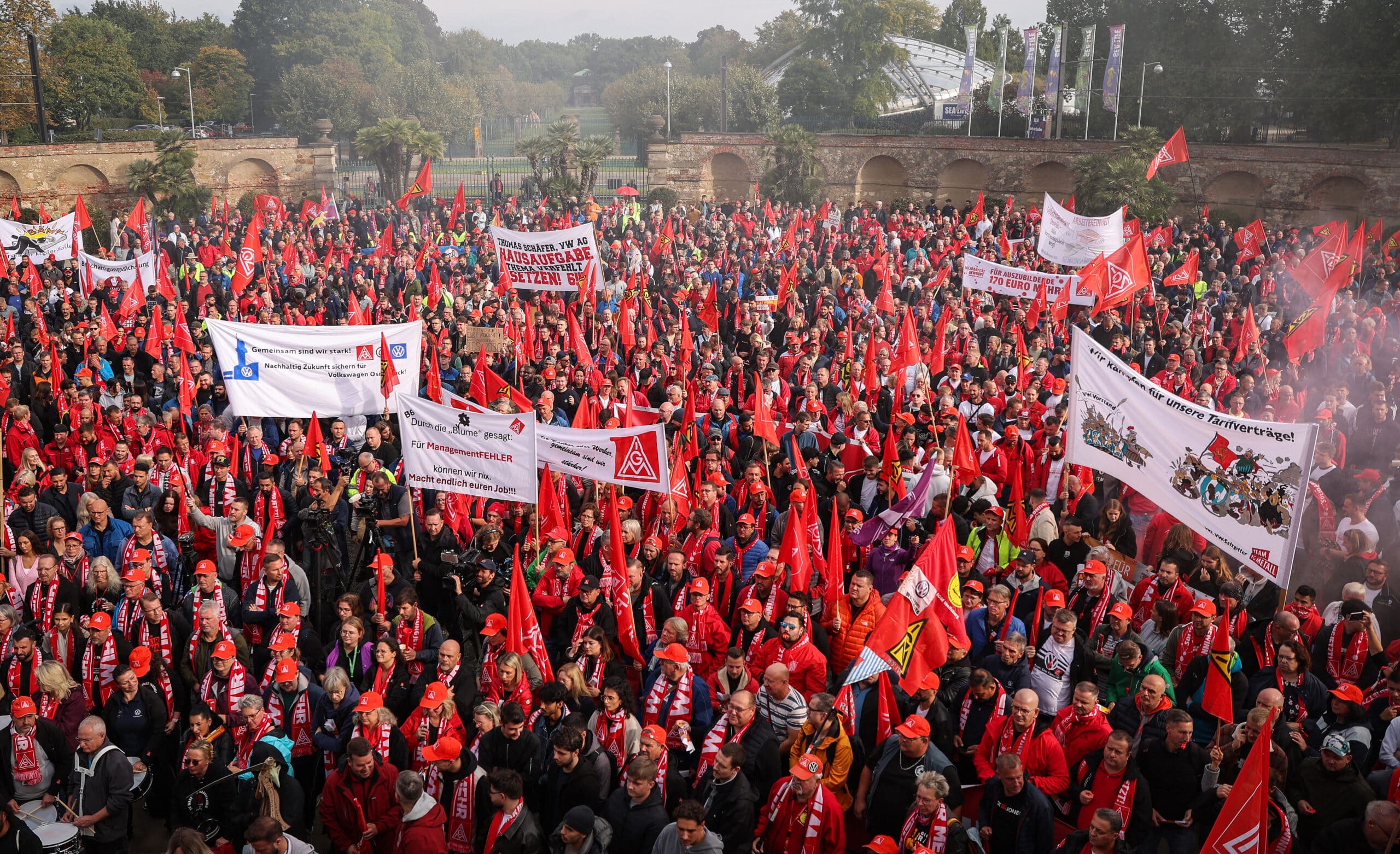Volkswagen still vague on cost-cutting plan; workers ‘disappointed’

Members of the IG Metall metalworkers union demonstrate on September 25, 2024, in Hanover, northern Germany, where talks between unions and the Volkswagen management are taking place following an announcement of German carmaker Volkswagen (VW) that drastic cost-cutting measures are needed to keep the carmaker competitive. – After Volkswagen’s bombshell announcement earlier in September 2024 that it could close factories in Germany for the first time, company management and unions will begin tense talks on a new pay deal. Volkswagen has repeatedly stressed that its costs are excessive and profit margins too low, particularly at its core VW brand. (Photo by RONNY HARTMANN / Agence France-Presse)
HANOVER, Germany — Unions on Wednesday criticized Volkswagen for failing to make specific proposals in the first round of talks over the German auto giant’s drastic cost-cutting plan, as thousands of workers picketed the meeting.
The discussion with management was “disappointing, even sobering,” Thorsten Groeger, lead negotiator for the IG Metall union, told reporters.
Volkswagen “did not concretize its proposal and did not sketch out a concept for the future” in the opening talks, Groeger said.
“Plant closures and mass layoffs remain on the table,” Groeger said.
Europe’s biggest carmaker shocked its 300,000 employees in Germany this month when it said it was considering closing factories in the country – a potential first in the group’s 87-year history.
Article continues after this advertisementREAD: Volkswagen mulls plant closures and job cuts in Germany
Article continues after this advertisementThe move sparked staff fury. Representatives accuse Volkswagen’s corporate leaders of mismanaging the 10-brand group and putting profits above building a sustainable future for the manufacturer.
After Volkswagen’s bombshell announcement, negotiations on a new pay deal were brought forward by a month, with talks held Wednesday in Hanover.
Outside the negotiation room, Volkswagen employees from plants across Germany carried banners criticising management and created a deafening chorus of whistles to show their disapproval.
‘Uncertainty’ at Volkswagen
The situation at Volkswagen was “serious,” the management’s lead negotiator, Arne Meiswinkel, said after the talks.
The manufacturer has been hit hard by high manufacturing costs, a stuttering switch to electric vehicles, and rising competition in key market China.
“We are at risk of being overtaken by international competition,” he said. “We therefore have to take action. To remain competitive, we have to comprehensively restructure Volkswagen together now.”
Volkswagen rejected the union’s proposal of a seven-percent pay rise for employees, Meiswinkel said.
“We need to lower costs, not raise them,” he said, adding that the group’s savings program would “require a contribution from employees.
At the demonstration outside, Volkswagen worker Diana Hein, 47, told Agence France-Presse the shock announcement had created a sense of “uncertainty” among employees.
“When they close one factory now, in two or three years it will be the same situation again,” said Hein, a union representative at the group’s flagship factory in Wolfsburg.
Management needed to be more “transparent” about their plans, she said.
READ: Volkswagen weighs staff reductions as electric shift stalls
“We don’t have a concept for the future at the moment – only savings plans,” said Jan-Soeren Luehr, 37, who also works at the Wolfsburg plant and is active in the union.
Strike threat
The negotiations will set the terms of employment for workers in Germany, some 120,000 of whom work at the core Volkswagen brand.
The Volkswagen Group also includes Seat, Skoda, Porsche, and Audi.
Stephan Weil, premier of Lower Saxony state, which is a major shareholder in Volkswagen, counselled against large-scale job cuts.
“We expect all those involved to find a joint way forward,” Weil told deputies in the regional parliament in Hanover.
Volkswagen CEO Oliver Blume said this week he wanted to agree a “package” of measures by the end of the year to shore up the struggling carmaker.
But workers representatives said Volkswagen had failed to put any proposals on the table.
“I expected that if the company says it wants to resolve the situation quickly… they will tell us what they are thinking about,” Daniela Cavallo, head of the powerful works council, told reporters.
The lack of clarity meant that “concern will increase” among employees, Cavallo said.
Groeger reminded management that the industrial peace obligation on workers would elapse at the end of November.
“As we have seen today, the workforce is willing to go out into the streets for our demands,” he said.